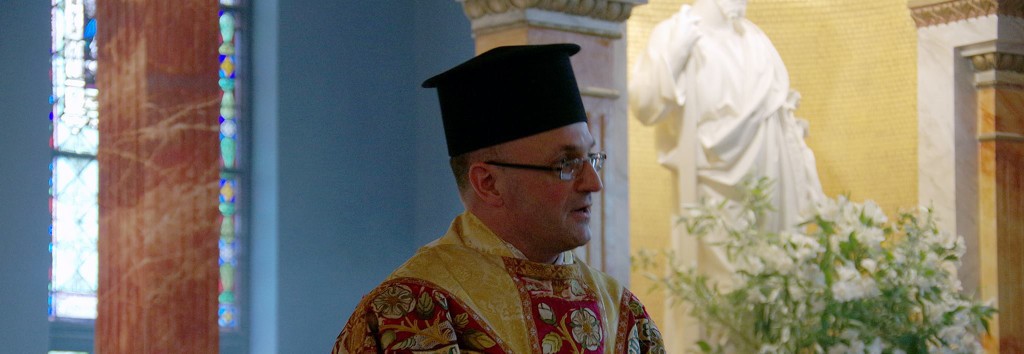
by Father Christopher Manuele
Truly this is a season of departures, saying ‘goodbye’, yet not abandoning. Our Lord left his Apostles and you seniors leave this Academy today. On that occasion, our Lord spoke these prophetic words to His disciples: “Amen, Amen, I say to you, he that believes in me, the works that I do, he also shall do. And greater then these shall he do.” Today these words are the prayer that we the faculty and your parents have for you as you depart from us: that you do greater than what you have already done and even greater than we ourselves have done.
How mysterious and strange are these words of our Lord Jesus. No doubt, a man like us; yet He is God. How is it possible for a mere man to do greater things than God? And yet the divine promise was given, and so it must be. Not so strange, however, that you seniors do greater than we have done here at Gregory the Great.
St. Gregory’s, if it is anything, it is modest: modest in its purpose, modest in its means, modest in its intention. Gregory the Great has made no attempt to be a ‘school of the wise’ – that is the privilege of a life well lived and the gift of the Holy Spirit. Gregory the Great does not pretend to make you scholars – that is the purview of institutions of higher learning. Rather our purpose simply was to teach you how to PLAY.
Perhaps, you did not realize this. Perhaps, this was even hidden from your parents as the real purpose of this school. But, in fact, this is what Gregory the Great is about. You might have thought you came for a high school education, and, indeed, you received that. Your parents were told this education is an education distinct from all others by its being a schooling in poetic knowledge: to awaken in you the very desire to know the truth, to desire what is good, to be captivated by beauty by leading you into contact with what is real: to discover by experience the totality of what is, in its whole-ality before we begin to articulate what it is. In a word, ‘to play.’
Does not wisdom call,
Does not understanding raise her voice?…
at the entrance of the portals she cries aloud:
“To you, O men, I call,
and my cry is to the sons of men…”
“Hear, for I will speak noble things,
and from my lips will come what is right;
for my mouth will utter truth;”
The Lord created me at the beginning of his work,
the first of his acts of old.
Ages ago I was set up,
at the first, before the beginning of the earth.
When there were no depths I was brought forth,
when there were no springs abounding with water…
when he marked out the foundations of the earth,
then I was beside him, like a master workman;
and I was daily his delight,
playing before him always,
playing in his inhabited world
and delighting in the sons of men.
And, now my sons, listen to me:
Happy are those who keep my ways.
(Proverbs 8:1, 3-4, 6-7, 22-24, 29-32)
per singulos dies ludens coram eo omni tempore ludens in orbe terrarum et deliciae meae esse cum filiis hominum … ludens, playing ludens coram Deo.
Can play, so perfectly exemplified by the child, also be the same activity of the wise man?
Play is the activity of wonder: to discover and touch a mystery, to delight in the inexhaustible treasures of everything. Play. Is it not to imagine what could be, ought to be from what apparently is not so? Is it not to create and to destroy and so to create again, a thousand times over? For what we have made we discover is not quite what it is.
We play because we delight in what God has made: He has left His mark, His inexhaustible truth, His all-encompassing goodness and the splendor of His beauty in all of His works: to behold them is to behold Him.
How unthinkable that He who is wrapped in darkness, a mystery so inaccessible; yet it is for us to glimpse Him – though as in a whisper, covering us by His almighty and creating hand to behold the backside of His uncreated glory.
At St. Gregory’s, if we have given you anything, if we could give you anything, it has been to delight with you in the works of God, to play before Him, to begin to learn this activity of the wise man.
You and I, indeed, – we all have played – though perhaps, it seemed like a labor. But all the activities here at Gregory the Great, all that you have done, were done so that you & I could play and play we did. The rigors of Euclid, Latin and Algebra, our dabbling in philosophy and theology so as to know the truth; reading history and literature, to parade before our imagination what is noble: the images of the virtuous and evil men so that we might choose the good and flee from evil; the discipline of rugby to subjugate the body and train the passions for what is better; a common life to learn sacrifice and to fall in love with what is beautiful, by creating beautiful things, to delight in what is good.
But this play is hard because we live in a cynical age, we have forgotten how to take delight in what is good. For we have been taught that there is nothing beyond ourselves which is desirable. So we had to learn how to play again. So simple our purpose here: not just to know (the truth), but also to become what we know (the good) and this desire to become them happens only when we first delight in them (the beautiful).
To know what justice is, is not enough- indeed, so exceedingly wonderful and worthy to be known; but to be a just man – that I, Christopher, be a just man – this is more to be prized. And so if, and when, I am persuaded by justice, captivated by its charm, when I take delight in just acts, then, perhaps, – God willing by His grace – I will be a just man. You looked to just men, living here and there; we have looked at the great men of old – saints, statesmen, scholars – and in them we have discovered the splendor and beauty of justice; by poetry and literature our hearts have been enflamed to be like them.
This is why beauty is so prized here at St. Gregory’s. Beauty is the bridge between knowledge and goodness – between what is and what is desirable for me. Beauty is to delight in things – but for me to become, for me to take hold of. And so of the multitude of things we do here at Gregory the Great – these thin encounters with reality which delight us so – is so that we might delight in God himself. ‘To know God’ is exceedingly good; but to be with God: to love and serve Him, to be as holy as He is holy is most excellent. And this is possible because we first have glimpsed the beauty of God, which arrests, draws us to Himself. And so we have delighted in Him.
Only before Him is the ugliness of this world, marred by sin, healed and restored; only there in the divine light is meaning bestowed and hope renewed; only in Him does the beauty of every man and creature shine with such brilliance and clarity that we can but cry out “it is good,” “it is very good.” This is why we never tire of contemplating Jesus, the Son of God; He is the Beautiful Shepherd, who by His incarnation persuaded us, taught us by his example how to be sons of God.
It is on purpose that you and I end our days here at St. Gregory’s in this playground- this chapel- in the Divine Liturgy of the Mass and of divine praise. Daily we have played here, we have been delighted and have delighted in the Lord and in the sons of God. This is why at Gregory the Great the sacred liturgy has first place, this is why the sacred liturgy must be -before all else- beautiful; it must be holy- not merely because of what it is: a mercy of peace, a sacrifice of praise; not merely because it is our mystical service to the Lord; but because by beauty we can take delight in the Lord, to stand before Him. So captivated by His grace and His charms, we will desire to be with Him now and in the age to come.
This is why our divine play looks to/ends in the Holy Eucharist – the communion of you and I in God – the foretaste of the divine communion of beatific knowledge perfect in love hereafter. You and I learned the true delight of man: man to God and man to man. Beauty, indeed, we are told will save the world, this beauty will save you and me. For this is the very promise of our Lord Jesus. “Truly, truly, I say to you, unless you eat the flesh of the Son of man and drink his blood, you have no life in you; he who eats my flesh and drinks my blood has eternal life, and I will raise him up at the last day.” (John 6:23-24)
Gentlemen, today is a day of rejoicing, we have marked it by this Divine Liturgy, we have begun this day in divine play and we will pass this day playing. You have spent these many years learning to play: in the liturgy of divine worship, in the life of Gregory the Great Academy and you have made it your own. We will behold, we will delight in your husbandry – your own handiwork of beauty – in the “Woodcutters Dream,” where truth and goodness embrace in beauty. You will go forth this day playing, growing wise by this play, and you will teach your children how to play. And having forever recourse to the play of the Divine Liturgy you will enter into the presence of the Lord to take delight in Him unto the ages of ages. Amen.
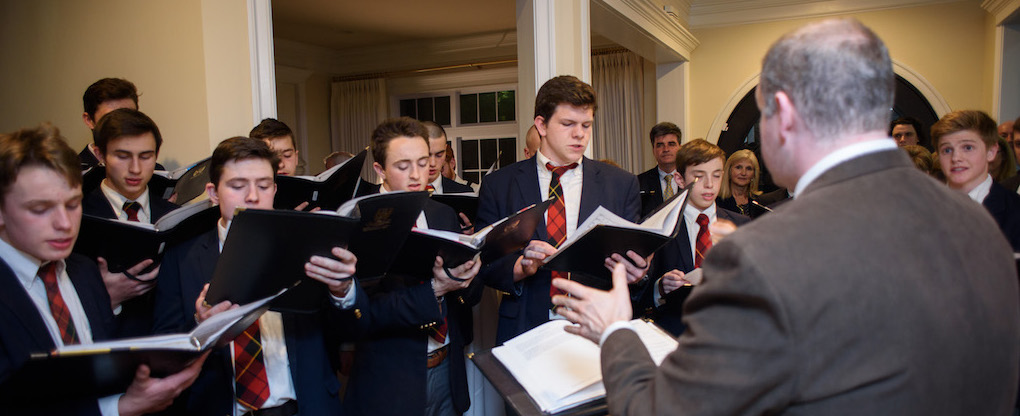

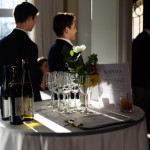
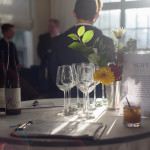
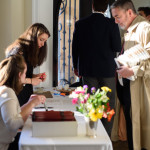
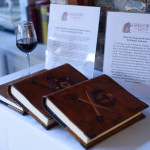
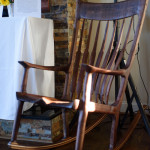
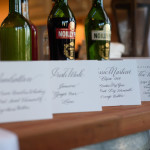


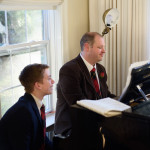
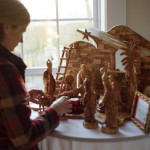
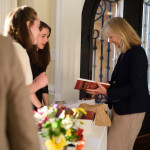
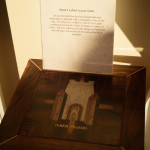
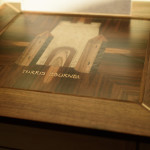
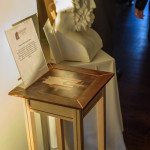
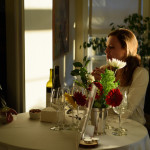
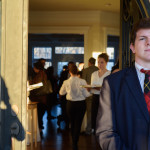
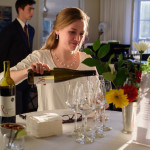
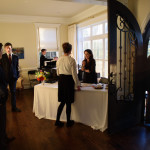
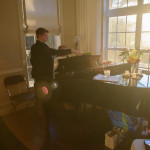
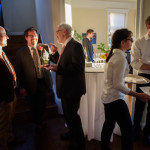
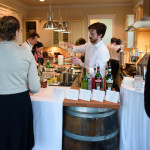
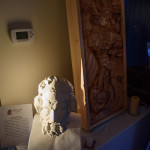



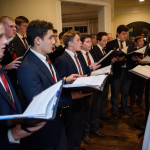
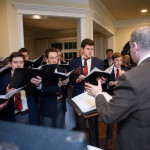
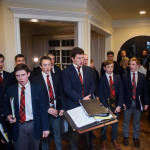
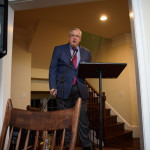
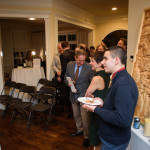
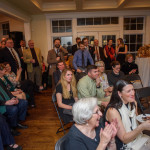
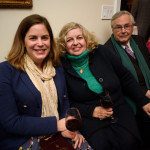
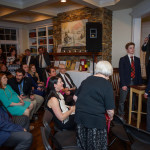
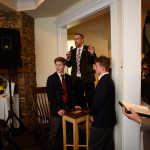
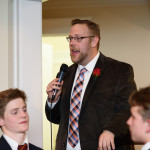
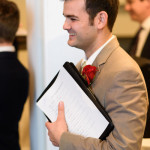
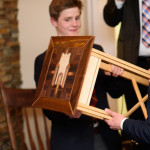
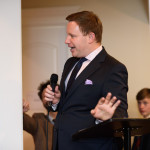
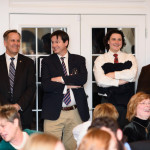
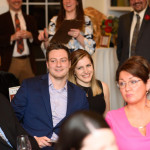
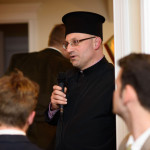
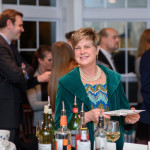
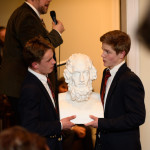
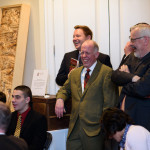
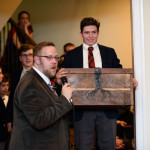
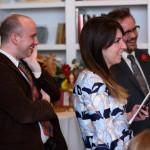
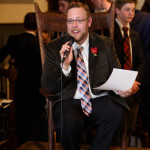
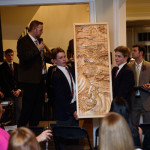
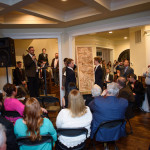
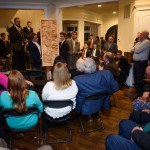
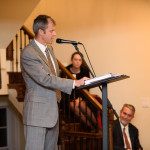
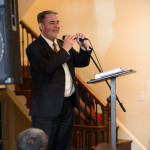
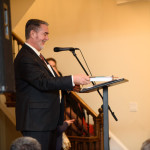
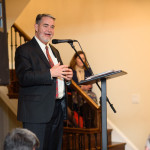
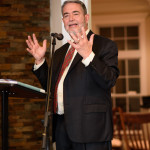
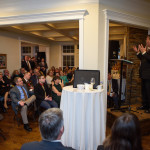
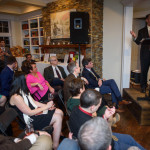
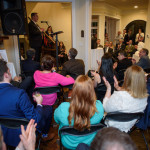
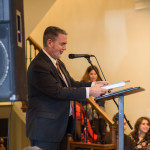

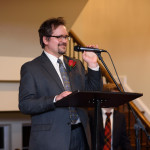

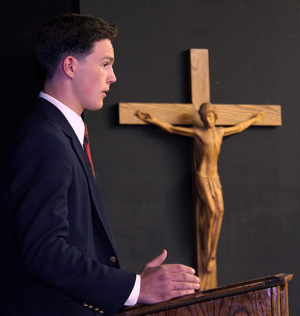 It is my honor to address you all today. For those of you who don’t know me, my name is David Hahn, and I am the son of the renowned writer and speaker, Kimberly Hahn.
It is my honor to address you all today. For those of you who don’t know me, my name is David Hahn, and I am the son of the renowned writer and speaker, Kimberly Hahn.